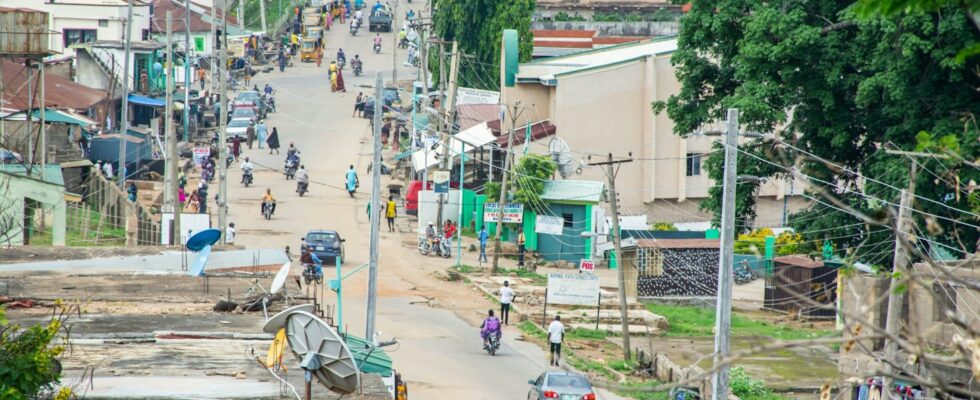Steen Knudsen has over twenty years of experience in this heavy part of the transport industry. For the past four years, he has been terminal manager at the container terminal in Lagos. In the middle of a conversation about business life in Nigeria, he interrupts himself; – He there, he’s not going to fly around here, he bursts out, as we drive past an employee walking along the quay. The employee is indeed wearing a helmet, but Knudsen explains that it is still too dangerous an area to walk around in – and completely against the company’s internal rules, he tells Verdens Beste Nyheder. – We have not had a serious work accident in four years. We spend time and resources on optimizing security every single day, says Kayode Daniels. Safety is evident when you move around the container quay at APM Terminals. Internal security must of course be in place when you daily move around large containers filled with all the world’s things. But the security that relates to enrichment and bribery is also a condition when doing business here. Corruption and cocaine Nigeria is a society where some have a lot, but many have extremely little. The country ranks number 145 out of a total of 180 on Transparency International’s corruption index. When shipping containers around the world, shady businesses such as drug smuggling and the illegal trade in endangered species are an inevitable part of the landscape. Inequality and sky-high youth unemployment are just some of the factors that make crime and corruption a constant challenge. According to UNODC, approx. 1.25 billion dollars paid in bribes to Nigerian public officials in 2023. At APM Terminals, it is said that there is zero tolerance for corruption, and there are also some precautions: – As an individual, you cannot release a container that has arrived in port. Several employees must sign the documents. This means that if you have an uncle or others who push for this kind of service, our employees can say quite honestly that it cannot be done, explains Steen Knudsen. – We have good cooperation with local authorities. They let us know when there is a suspicious container that needs to be investigated further before the contents can be released, explains Kayode Daniels. When asked how often it happens, the answer comes quickly: – Every week. Greater challenge in the private sector Nigerians have become less willing to bribe public officials. In return, the prevalence of bribery in the private sector has risen from six to 14 per cent in the same period. There could be, for example, doctors in private hospitals, or other employees in private companies who put the money in their own pockets to a greater extent. But the phenomenon of bribery in the private business world is only half as widespread. Steen Knudsen highlights Nigeria as a country with great growth potential and opportunities – if you can navigate a changing environment and a different culture. – We operate in an industry where our values are tested from time to time. One may miss out on some opportunities in the short term. But in the long term, in return, it makes life much easier for a business and its employees, when all employees and the authorities know that bribery is a no-go here, he explains. In addition to the fact that many Nigerians have become less willing to accept bribes, there is also another notable advance in the UNODC report: Fewer citizens experience negative consequences when they reject bribes. In 2019, almost half reported that a refusal had negative consequences. But just four years later in 2023, this applied to 38 per cent. According to the UNODC report, it suggests that Nigerians are becoming “more and more comfortable confronting corrupt officials without fear of consequences”. Daniels and Knudsen both emphasize that at APM Terminals there is an expectation that you live up to the company’s values even when you are not at work. But that can be easier said than done. Although there has been a marked improvement, there is still some work to be done to stop the general corruption in the country, concluded the UNODC’s report. Bribery in Nigeria is so normalised, that in more than half of the cases it is still asked for directly – without hiding it. – When you land at the airport, for example, you meet some government officials on your way through security, customs, etc. You can still be asked “… and do you have a little something for me?”. But when it comes to a friendly refusal, most are just met with a small smile. If it works, then it works, right? In the past, there would often be a clear expectation of getting a few dollars. And no apologetic smile when the rejection came. An administrative process could suddenly become very difficult. I don’t experience that now, says Knudsen and adds: – But it must be said that it can be easier for a foreign person like me to give that refusal. There are sometimes other expectations of local residents, which only makes it all the more remarkable that they stick to their cause. Verdens Beste Nyheder was invited to Nigeria by the Danish Ministry of Foreign Affairs.
ttn-70
Something remarkable is happening with corruption in Nigeria

